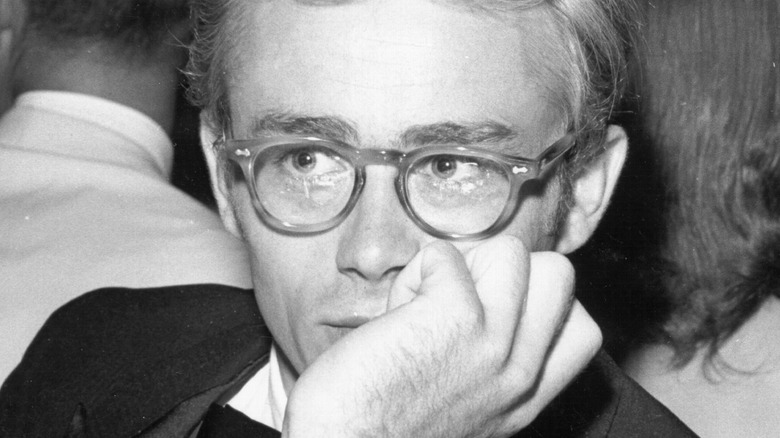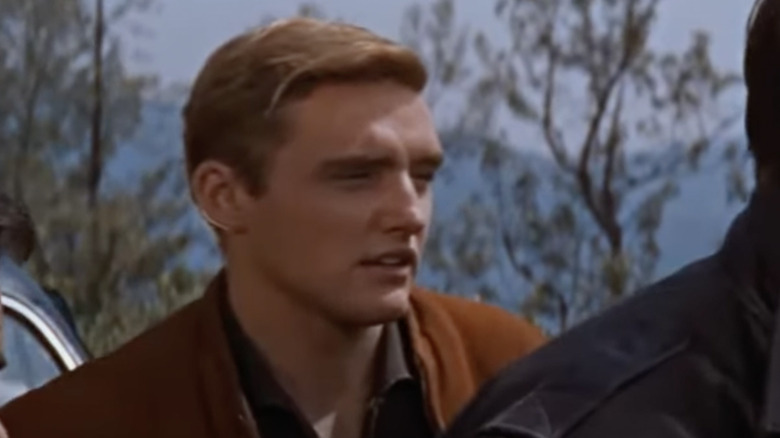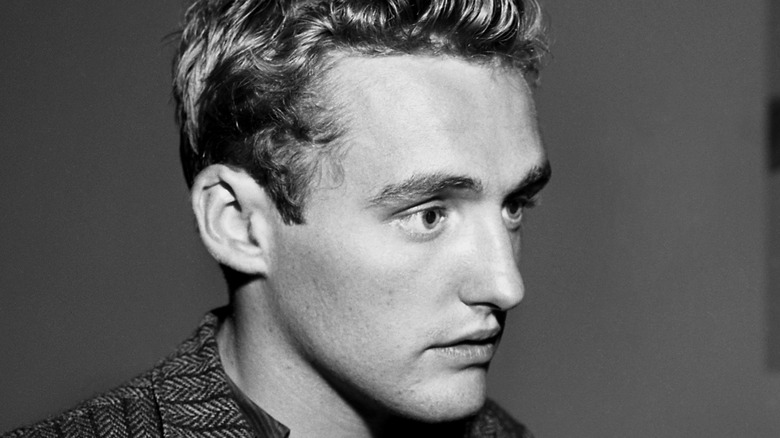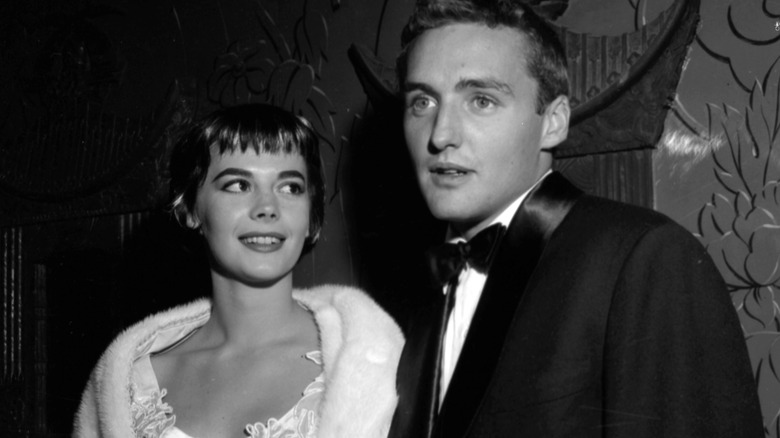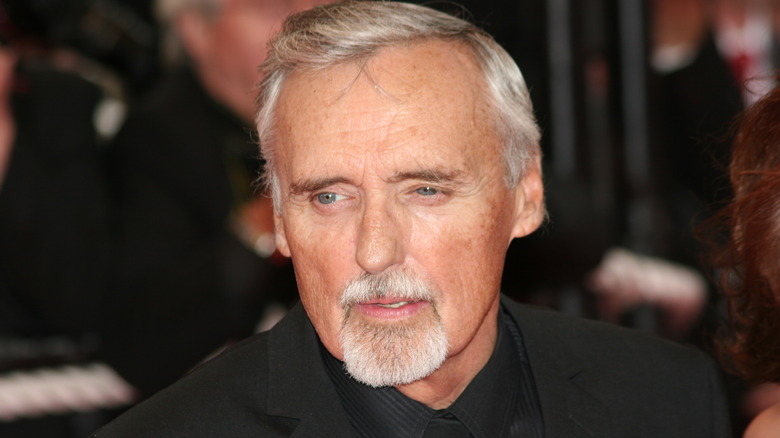James Dean And Dennis Hopper Had A Complicated Relationship
James Dean. Dennis Hopper. Two timeless icons of Hollywood cool, seemingly destined to have met, which they did, however briefly.
Dennis Hopper was born in Dodge City, Kansas in 1936 (via Britannica). At nine years old, his dad returned from World War II, and moved the family first to Kansas City, Missouri, and then to San Diego, California, where Hopper would attend high school. According to Interview Magazine, he started performing Shakespeare at The Old Globe theater in San Diego at just 13 and got badly bitten by the proverbial acting bug. A few people in show business took notice of the young thespian, which led to Hopper appearing on a couple of television shows, including "Cavalcade of America" and "Medic."
Soon thereafter, the movie studios came calling — seven of them, to be exact — and Hopper had a meeting with Columbia. Hopper said the exec told him he was "the most naturalistic actor I've ever seen, but we've got to send you to school and take all that Shakespeare out of you." To which Hopper reportedly responded that the exec could go expletive himself, leading to Hopper's ban at the studio until "Easy Rider" about 14 years later, in 1969. Unfazed by the ban, Hopper went on acting, and landed a role that would change his life forever.
Rebel Without A Cause and Goon
In 1955, at just 19 years old, Dennis Hopper made his film debut in a little movie you may have heard of called "Rebel Without A Cause." Credited only as "Goon," a vaguely threatening leather-jacket-clad ruffian teen, it was there that Hopper would meet James Dean.
According to Mark Rozzo's book, "Everybody Thought We Were Crazy: Dennis Hopper, Brooke Hayward, and 1960s Los Angeles," (via Vanity Fair) Dean's performance skills presented the biggest threat yet to Hopper's swaggering confidence as a budding actor. "I didn't think there was anyone to top me," he said. "Watching Dean act was like watching someone pull miracles out of the air."
Hopper became obsessed with trying to figure out how Dean was doing it. But, Dean was a movie star, and a few years older than Hopper, so it wasn't like he could just walk up and ask about his process. Plus, Hopper's newfound insecurity wouldn't allow things to be that simple either; it seemed like he wasn't even on Dean's radar, which surely escalated Hopper's ire, so he proceeded like ... well, like a vaguely threatening ruffian teen.
'Why do you want to be an actor?'
After they filmed the famous drag racing scene in "Rebel Without A Cause," Dennis Hopper could take it no more. He followed James Dean and apparently shoved him into a car, as Vanity Fair writes. "What the hell are you doing?" he demanded of Dean. "I thought I was the best actor I'd ever seen until I saw your work, and here you are doing things I can't even comprehend!" Dean, likely surprised and confused by the assault, was elusive at first, according to Hopper. But then, Dean started talking. More importantly, he asked questions, like "Why do you want to be an actor?" that made Hopper dig deep.
The two actors discussed a sense of rage against their parents, for different reasons, and a subsequent drive to authentically express themselves to audiences in a way that only the craft of acting satisfied. The realization was profound for Hopper. "We found we were so much alike," he said, "both from farms, this early loneliness, unable to communicate at home."
Dennis Hopper received Life-Changing Advice
James Dean also gave Dennis Hopper the life — and craft — changing advice he'd been craving: "Do it," the smoldering-eyed icon told him, "Don't show it," as Vanity Fair writes. The advice would change how Hopper tackled his roles, and the peek into Dean's mind only made him want to emulate Dean more. He and a handful of other actors about the same age, including Dean's "Rebel" co-star Natalie Wood, went where they knew Dean went, and talked about many very serious things and did all the stuff that pretentious teens who don't know yet that they're pretentious did. Hopper continued to adore Dean.
He'd go on to work with Dean again, in Dean's third and final film, "Giant," also starring Elizabeth Taylor and Rock Hudson. When Dean praised the work Hopper did as the sensitive son of a powerful father, Hopper cried. Hopper's worship of all things James Dean did not go unnoticed, and not in a good way. With Dean regularly displaying his power on set by doing obnoxious things like peeing in plain sight of everyone and then spinning it into some sort of advice for the starry-eyed Hopper, "Giant" director George Stevens wasn't exactly amused. Hopper claimed that Stevens made life on set difficult for him, saying, "Everything that Dean did was somehow my fault." But, Hopper and Dean only ever got so close; Hopper was essentially a perpetual student of Dean's, and Dean seemed to be a world unto himself.
A Life and Mentorship Ended Too Early
A few months after Dennis Hopper wrapped up his role in "Giant," Dean died in a head-on accident while driving his sportscar. And, while Hopper never claimed that he and Dean had ever been like brothers, he was no less devastated. "After Jimmy died it was as if somebody who'd been protecting me was gone — I was on my own now and had my own fights," he said, per Vanity Fair. "The whole experience broke my heart."
"Rebel Without A Cause" would be released one month after Dean's untimely demise, and would go on to become a classic of American cinema, and bring angst-filled teens into the national spotlight and cement James Dean as their mascot. And of course, Hopper would go on to a long and highly successful career as an actor, starring in such classics as "Easy Rider," "Apocalypse Now," and "Blue Velvet," among them (via IMDb), before his death at age 74 in 2010.
